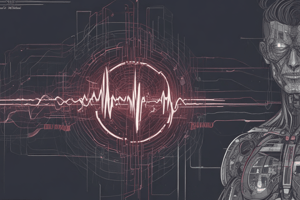Podcast
Questions and Answers
What does the QRS complex represent in an ECG?
What does the QRS complex represent in an ECG?
Which of the following intervals represents the duration from the beginning of ventricular depolarization to the end of repolarization?
Which of the following intervals represents the duration from the beginning of ventricular depolarization to the end of repolarization?
What is the normal range for the PR interval in an ECG?
What is the normal range for the PR interval in an ECG?
What does a normal QT interval measure?
What does a normal QT interval measure?
Signup and view all the answers
In the context of an ECG, what does the ST segment indicate?
In the context of an ECG, what does the ST segment indicate?
Signup and view all the answers
What does the P-R interval specifically measure in the ECG?
What does the P-R interval specifically measure in the ECG?
Signup and view all the answers
Which of the following best describes the T-wave in an ECG?
Which of the following best describes the T-wave in an ECG?
Signup and view all the answers
Which part of the ECG is associated with ventricular depolarization?
Which part of the ECG is associated with ventricular depolarization?
Signup and view all the answers
What does the QT interval encompass in an ECG reading?
What does the QT interval encompass in an ECG reading?
Signup and view all the answers
What is generally true about the U-wave in an ECG?
What is generally true about the U-wave in an ECG?
Signup and view all the answers
What does the P wave represent in ECG activity?
What does the P wave represent in ECG activity?
Signup and view all the answers
Which interval reflects the total electrical activity in the atria before ventricle activation?
Which interval reflects the total electrical activity in the atria before ventricle activation?
Signup and view all the answers
What is the primary activity associated with the QRS complex in an ECG?
What is the primary activity associated with the QRS complex in an ECG?
Signup and view all the answers
Which component reflects the time period between ventricular depolarization and repolarization?
Which component reflects the time period between ventricular depolarization and repolarization?
Signup and view all the answers
What does the QT interval encompass in terms of heart activity?
What does the QT interval encompass in terms of heart activity?
Signup and view all the answers
What is the maximum duration for the ST segment in an ECG?
What is the maximum duration for the ST segment in an ECG?
Signup and view all the answers
Which interval measures the time from the beginning of atrial depolarization to the beginning of ventricular depolarization?
Which interval measures the time from the beginning of atrial depolarization to the beginning of ventricular depolarization?
Signup and view all the answers
Which of the following is true about the duration of the QRS complex?
Which of the following is true about the duration of the QRS complex?
Signup and view all the answers
What does the QT interval specifically measure?
What does the QT interval specifically measure?
Signup and view all the answers
Which component indicates the peak of the QRS complex?
Which component indicates the peak of the QRS complex?
Signup and view all the answers
Study Notes
ECG Segments and Intervals
- Heart Rate: 60-100 bpm
- Rhythm: Regular/Regular
- P-wave: 0.08-0.11 seconds
- PR Interval: 0.12-0.20 seconds
- QRS Complex: 0.08-0.10 seconds
- QT Interval: Less than 0.38 seconds
- ST Segment: Less than 0.12 seconds
- T-wave: Less than 0.20 seconds
Studying That Suits You
Use AI to generate personalized quizzes and flashcards to suit your learning preferences.
Description
Test your knowledge of ECG segments and intervals with this quiz. Covering essential components like P-waves, PR intervals, and QT intervals, it will help you understand the critical aspects of cardiac function. Perfect for students and professionals in the medical field.




